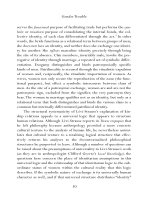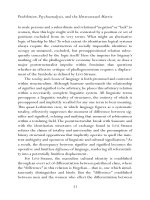GENDER TROUBLE 41
Bạn đang xem bản rút gọn của tài liệu. Xem và tải ngay bản đầy đủ của tài liệu tại đây (20.73 KB, 1 trang )
Gender Trouble
Apart from the foundationalist fictions that support the notion of
the subject, however, there is the political problem that feminism
encounters in the assumption that the term women denotes a common
identity. Rather than a stable signifier that commands the assent of those
whom it purports to describe and represent, women, even in the plural,
has become a troublesome term, a site of contest, a cause for anxiety.As
Denise Riley’s title suggests, Am I That Name? is a question produced by
the very possibility of the name’s multiple significations.3 If one “is” a
woman, that is surely not all one is; the term fails to be exhaustive, not
because a pregendered “person” transcends the specific paraphernalia of
its gender, but because gender is not always constituted coherently or
consistently in different historical contexts, and because gender intersects with racial, class, ethnic, sexual, and regional modalities of discursively constituted identities. As a result, it becomes impossible to
separate out “gender” from the political and cultural intersections in
which it is invariably produced and maintained.
The political assumption that there must be a universal basis for
feminism, one which must be found in an identity assumed to exist
cross-culturally, often accompanies the notion that the oppression of
women has some singular form discernible in the universal or hegemonic structure of patriarchy or masculine domination. The notion of
a universal patriarchy has been widely criticized in recent years for its
failure to account for the workings of gender oppression in the concrete cultural contexts in which it exists.Where those various contexts
have been consulted within such theories, it has been to find “examples” or “illustrations” of a universal principle that is assumed from the
start.That form of feminist theorizing has come under criticism for its
efforts to colonize and appropriate non-Western cultures to support
highly Western notions of oppression, but because they tend as well to
construct a “Third World” or even an “Orient” in which gender oppression is subtly explained as symptomatic of an essential, non-Western
barbarism. The urgency of feminism to establish a universal status for
patriarchy in order to strengthen the appearance of feminism’s own
6









